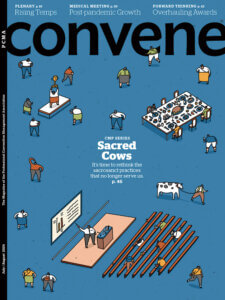
Michelle Russell
Convene Editor in Chief
When we asked planner respondents to our recent Salary Survey to share their sacred cows in the events industry, some griped about things that are largely out of their control, like rising costs. Others brought up approaches to conferences — which have stood the test of time but are as flat as stale beer — that are within event organizers’ power to rework or at least to advocate for their re-imagination. In response to our sacred cow question, meeting designer Adrian Segar posted on X that we should “get rid of expensive keynotes, predetermined schedules of lectures, large events that try to cover everything with no support for tribes to find each other.” Let’s replace those, he added, with “small, participant-driven, participant-rich meetings, and sessions designed for connection and learning.”
Likewise, consultant Victoria Matey, who uses insights from behavioral science, psychology, and neuroscience to inform events, identified on social media more of what is within planners’ hands to remedy: “unstructured networking, jam-packed agendas, content delivery that is not brain-friendly” and processes — “long reg forms [and] irrelevant post-event survey questions.”
And PCMA’s managing director for EMEA, Jaimé Bennett, posted that she wants to give name badges — that quintessential visual shorthand for conference attendee — the heave ho. In their place, Bennett suggested people choose a color wristband that is associated with their interests to spark conversations instead of our default method of identifying others according to name, title, company, country, etc.
How radical some of these ideas seem — and yet ripe for picking. Why should we remain stuck?
An article I read by design firm IDEO about its client Moderna put our industry’s complacency into sharp relief. Moderna, you’ll recall, delivered a COVID-19 vaccine to clinical trials in such a compressed timeframe that it set a record for the drug industry.
The article talked about Moderna’s culture — which includes embracing speed and accepting risk — as largely responsible for such a feat. An example that exemplifies employees’ shared sense of urgency: One day, “a critical piece of equipment arrived, but it was too big to fit through the door. Taking it apart would have added days to their timeline,” IDEO writes. “So employees took sledgehammers to a wall instead.”
But Moderna’s explosive growth posed a challenge to its culture — the need to hire “hundreds of employees from outside the biotech industry, from organizations with establishment cultures that are sometimes slow, bureaucratic, territorial, and cautious,” according to IDEO. Sound familiar?
To help set the tone for new hires, Moderna worked with IDEO to craft a series of mindsets that are communicated to all who join the company. Among them: Urgency is an investment. Risk creates opportunity. Pivots are progress. Your job is more than.your job description. We don’t have to grow to grow. Push past the possible.
It’s Getting Hot in Here
As I write this, there is an air quality alert for my New York City suburb due to another excessively hot day in a series of days where the temperature has soared into the high 90s. Deputy Editor Barbara Palmer explores what the Earth’s rising temperature means for events in “How Extreme Weather Is Impacting Events.” And I take a deep dive into all the elements that should be taken into account to accurately calculate an event’s carbon footprint in “Measuring an Event’s Carbon Footprint — It’s All in the Details.”


